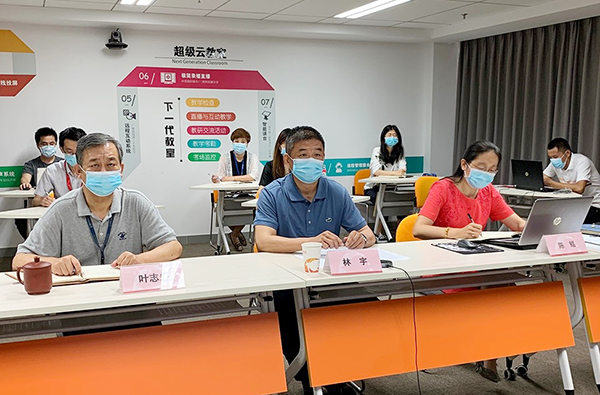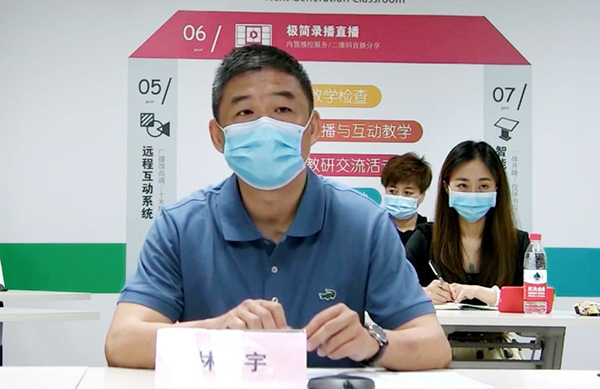 On the morning of 2 July 2020, the Open University of China (OUC) held a video conference on enrolment for the 2020 autumn semester within its organisational system nationwide.
On the morning of 2 July 2020, the Open University of China (OUC) held a video conference on enrolment for the 2020 autumn semester within its organisational system nationwide.
Lin Yu, vice president of the OUC, Ye Zhihong, director of the Department of Academic Affairs, and Chen Kun, deputy director of the Department of Academic Affairs, attended the meeting. 4,809 people, including leaders in charge of enrolment and staff engaging in recruitment work from all branches, schools, and study centres, attended the meeting via video.

Lin Yu discussed the importance and significance of the enrolment work from four different perspectives. First, enrolment is the foundation for the survival and development of the whole OUC operational system, affecting every bit of the school’s work, both internal and external. Second, it is a starting point and foundation for talent cultivation. To a certain extent, the quality of students determines the quality of education and that of learner development. Third, it represents the social image and reputation of the university. We should not view enrolment as a specific, trivial or streamlined task, since it shapes the first impression members of society get of the university. Successful enrolment enhances the reputation of the university. Fourth, successful enrolment is a specific way of supporting the implementation of the national reform and development of higher academic continuing education.
Lin Yutong gave a report on the basic situation of enrolment in the 2020 spring semester and praised the achievements that have been made. He noted that, due to the COVID-19 epidemic, enrolment for the spring semester faced unprecedented challenges. Nevertheless, all admission units have given full play to the advantages of the OUC as an “Internet Plus" university and a neighbourhood university centred around the people and thus achieved steady enrolment in the spring. Although being in the "epicentre" of COVID-19, the Hubei Branch has seen enrolment creep up thanks to the unremitting efforts of all staff in the branch. Despite the steady growth of enrolment across the OUC system, the enrolment scale of some units, for example, branches in central Chinese cities, has declined due to the impact of COVID-19, and the enrolment structure in branches and colleges has changed.

Lin Yu pointed out three problems currently facing enrolment work. First is the lack of planning and the undesirable completion rate. Second, the transformation of enrolment in the OUC system hasn’t been deep enough to meet market needs. Methods of and channels for enrolment at the grassroots level are still relatively simple. Third, management of the enrolment system should be strengthened. We should further improve the management and control of all aspects of enrolment work, especially the management of enrolment staff.
Lin Yu put forward five requirements for enrolment work in autumn 2020. First, it is necessary to adopt internet thinking and use new technology and new media to develop new channels and innovate the form and content of enrolment publicity. Second, we should adhere to the concept of “four orientations,” identify the focus of the enrolment work, fully explore the educational needs of the public, and actively seek out groups that are eager to receive education. Third, we must not touch the red line and refrain from recruiting students from places beyond our jurisdiction or appointing intermediary institutions to engage in enrolment, which is against the regulations. Fourth, we should maintain the bottom line, strictly implement our enrolment plan, and stringently review admission qualifications. Fifth, we should standardise the enrolment process and match the abilities of implementation of the enrolment plan with the operational capacities of the study centres.
The meeting introduced the emergency measures for securing enrolment scale introduced by the OUC headquarters during the epidemic, including launching multiple rounds of enrolment, strengthening publicity and guidance, advertising via video on new media platforms, rolling out online enrolment on the WeChat official account, implementing admission qualification examinations in stages, and the trial issuance of electronic enrolment notices. These measures have greatly alleviated the adverse impact of the COVID-19 epidemic on the enrolment work of all branches, schools, and study centres.
The meeting also shared the enrolment data of each branch, school, and study centre for the 2020 spring semester, as well as the enrolment situation for all majors. During the spring semester, many enrolment staff from the OUC study centres obeyed the requirements of local epidemic prevention and control, and were arranged by local governments to volunteer in the community. Many staff members at study centres attached to secondary and higher vocational schools have not yet resumed work. In this situation where both epidemic prevention and control and enrolment need to be stressed, although the enrolment scale of some branches is trending downward though, it is still hard earned. The leaders of the meeting expressed their sincere thanks the hard work of admission staff at all levels of the OUC. It is hoped that all regions will successfully engage in big data analysis of enrolment and that the regions will focus on the actual needs of economic and social development while carrying out enrolment work, so as to meet the learning needs of different learning groups.
The meeting laid out enrolment work for autumn 2020. All branches and schools should, according to the guiding ideology of "steady growth and quality assurance" and by continuously adhering to the epidemic prevention and control measures, give full play to the advantages of being an “Internet Plus" University and develop new concepts for enrolment work. They are required to make full use of new media, innovate methods of enrolment publicity, and do a good job of finding potential students, examining admission qualifications, and promoting electronic enrolment notices. They are also expected to continue to implement and promote the blacklist system for cooperative schools, strictly strengthen enrolment supervision, standardise enrolment behaviours, optimise enrolment services, and further expand the influence of the OUC as a brand. The OUC headquarters and all of its branches, schools, and study centres should adopt more precise measures, work together to overcome difficulties, and realise positive interactions in the enrolment work of the OUC system in order to push the OUC’s degree education to new heights.
By the OUC Admissions Office, photos by Liu Bojia and Wei Bangru